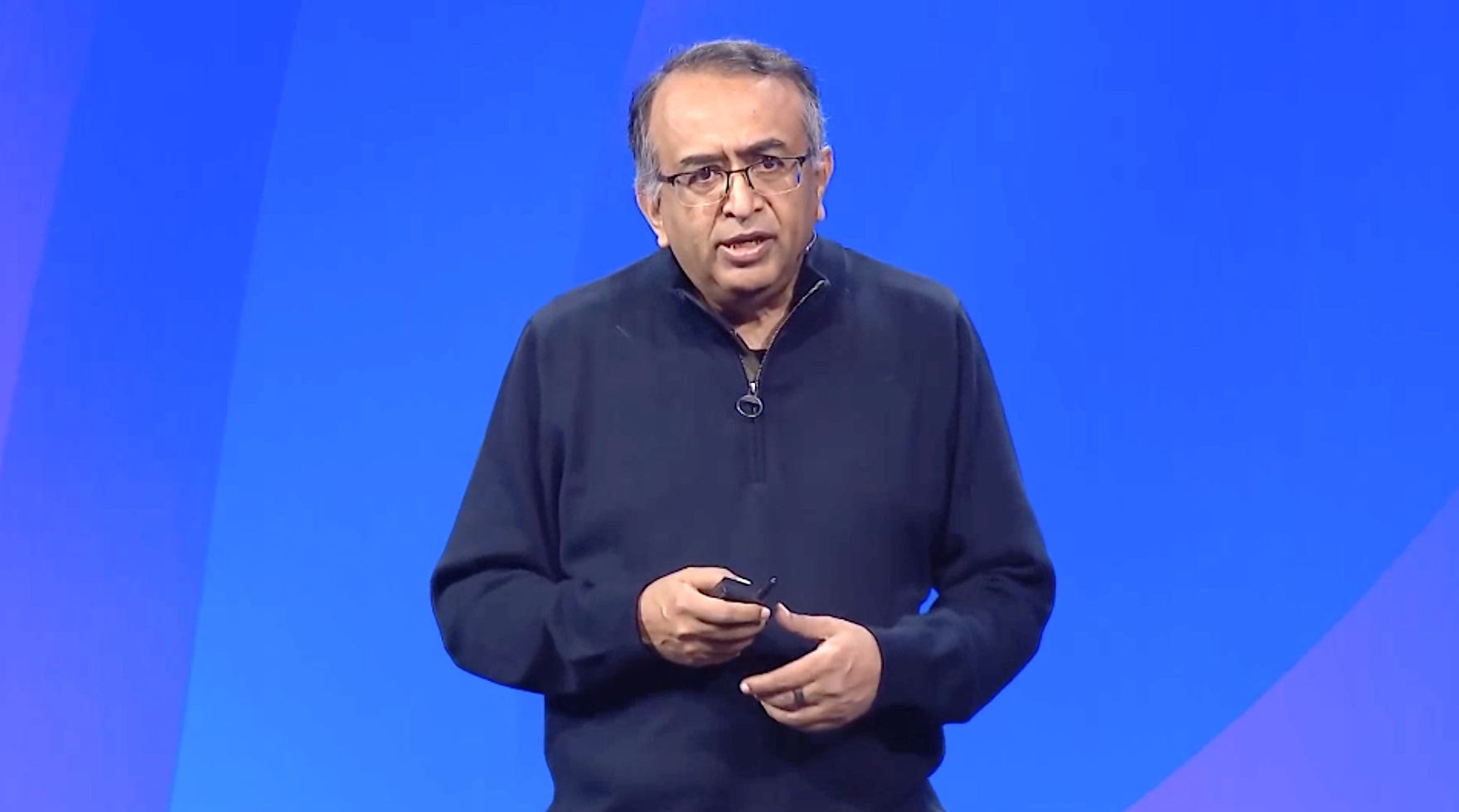 CLOUD
CLOUD
 CLOUD
CLOUD
 CLOUD
CLOUD
VMware Inc.’s user event last week in Las Vegas, Explore, formerly known as VMWorld, offered a cornucopia of news, with multicloud and artificial intelligence the overarching themes.
Given the pending acquisition by Broadcom Inc. and the fact that this was the first user event with Raghu Raghuram (pictured) as chief executive for a full year, I was curious to check out the mood of its massive customer base. One of the concerns of the Broadcom purchase looming in the background was that it could distract the company and slow down innovation. Given the flurry of news, that certainly wasn’t the case.
Here are my top thoughts from VMware Explore:
A quick look at Broadcom’s acquisition history shows companies such as Computer Associates and Symantec. These were older, legacy software companies with big installed bases but they had not seen significant innovation for years. For a company such as Broadcom, it presents the opportunity to cut costs and squeeze maintenance dollars while the install base shrinks.
Industry watchers, I included, have wondered if Broadcom would treat VMware like the other software assets in its portfolio or will it give VMware the freedom to continue to innovate. At the event, I had discussions with many VMware leaders up to Raghuram, and it appears Broadcom CEO Hock Tan has spent a great deal of time learning how VMware operates and will let the company continue to chart its own path.
I believe, post-deal closing, that Broadcom will look at every business unit, and ones that do not fit the mission of multicloud or AI may get shed. But VMware customers should be confident there will be no disruption, at least in the short term.
During an analyst Q&A, Raghuram mentioned that the company’s position in the data center was “uncontested,” and that’s certainly the case. There have been many attempts to disrupt its virtualization business from the likes of Microsoft Corp. and Nutanix Inc., but all that have tried have failed. The reality is VMware has reached “de facto standard” status, and vCenter is the preferred data center management tool for the majority of enterprises.
In fact, during a Q&A with a VMware customer, theCUBE host Dave Vellante asked how difficult it would be to unwind VMware from its operations, and the answer was that it would cost the company billions in disruption, so no amount of savings gained from switching vendors is worth it.
If companies look at multicloud as an extension of the data center, then who better to enable it than VMware? I could assume the cloud providers, but Amazon Web Service tools don’t work in Google Cloud Platform, GCP tools don’t work in Microsoft’s Azure, and so on. VMware is in an excellent position to be the abstraction layer that normalizes services across public and private clouds.
The term multicloud refers to an environment where public and private clouds span multiple public and private clouds. The next evolutionary step for the cloud is to evolve from multicloud to distributed cloud, where a single cloud environment would span private and public clouds as well as edges of all types. The logic behind the VMware opportunity at the edge is the same as the one for multicloud, as one could look at it as an extension of the data center. Ideally, customers would have one operational model to manage the distributed cloud environment.
The one difference with edge computing over a centralized cloud model is that there will be some use cases where the edge lives in isolation. Think of a factory floor, oil and gas, and other use cases. In this case, VMware would need to compete on a best-of-breed basis.
At Explore, VMware announced several edge innovations, including VMware Edge Cloud Orchestrator, which provides unified management between VMware SASE and its Edge Compute Stack. It also announced the initial availability of VMware Private Mobile Network to enable customers to deploy their private cellular services. Private 4G/5G will bring connectivity to the edges.
In the Expo Hall, VMware displayed several edge use cases, including automotive manufacturing and retail. On the topic of retail, VMware also announced its Retail Edge solution. Going to market vertically can help customers understand what’s possible. I would expect VMware to roll out other vertical solutions.
VMware has been dancing around networking since it acquired Nicira about a decade ago. The company followed that up with the 2017 purchase of VeloCloud, which moved it into the software-defined wide-area network market. Initially, VMware’s route to market was through its traditional compute buyer, where the company promised to disrupt the network industry, much like it did servers.
As one could imagine, this kind of harsh messaging didn’t sit well with network engineers, but over the past several years, the company has been more “network friendly” and designed its products to be deployed and operated by network engineers. I interacted with more network professionals at this year’s event than any other previous Explore or VMWorld. VMware has made its living off selling to computer professionals, but networking offers a new frontier for the company.
Regarding security, it’s unclear what VMware’s long-term strategy is. The company has some good assets, such as its Security Service Edge stack, which includes zero-trust network access, secure web gateway and cloud access security brokers. At the event, the company also announced a new ransomware recovery product, addressing a significant and growing problem for enterprises. However, despite a broad portfolio of tools, VMware is not a security platform, as one would think of Palo Alto Networks Inc. and Fortinet Inc. Looking ahead, VMware needs either to commit to being a security platform and to build out broader capabilities, or shed some of its assets and partner for the capabilities. The security industry is shifting to platforms, and vendors need to be all in.
Zeus Kerravala is a principal analyst at ZK Research, a division of Kerravala Consulting. He wrote this article for SiliconANGLE.
THANK YOU